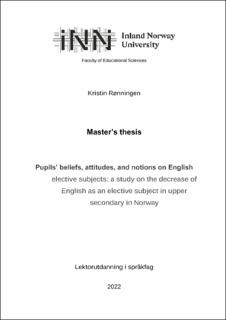Pupils’ beliefs, attitudes, and notions on English elective subjects: a study on the decrease of English as an elective subject in upper secondary in Norway
Abstract
Den negative trenden i antall elever som velger engelsk som et av sine valgfag er skremmende, og må tas opp og undersøkes. Hvilke faktorer påvirker elevene til å velge valgfag, og hvordan korrelerer disse valgene med fremtidige planer om høyere utdanning og arbeidsliv? Denne studien tar sikte på å undersøke faktorer som elevenes motivasjon, påvirkning fra andre og tidligere erfaringer med engelsk. Videre tar studien sikte på å belyse begrensende tilbud om valgfag og kombinasjonssammensetningen av valgfag. For å undersøke dette benytter studien et kvantitativt undersøkelsesdesign. Undersøkelsesmetoden er en halv-lukket kvantitativ spørreundersøkelse utført på to videregående skoler. Denne undersøkelsesmetoden har blitt brukt for å svare på de tre overordnede forskningsspørsmålene:- Hvordan reflekteres elevenes oppfatning og holdning på engelske valgfag?- Hvilke forskjeller kan vi bemerke ut fra kjønn i valg av fag?- Hvor utrustet føler elevene seg til høyere utdanning, hverdagsliv og arbeidsliv?
Dataene vil bli stratifisert ved hjelp av kjønn, og virke som en variabel for å undersøke elevenes erfaringer og oppfatningner. Funnene i studien antyder at elevenes motivasjon er blandet, der jentene er mindre motiverte enn guttene. I tillegg mente elevene at de kunne tilstrekkelig med engelsk når det kom til høyere utdanning og arbeidsliv. Videre fant elevene det obligatoriske engelskfaget nyttig, men ikke interessant. Dette er en sterk indikasjon på hvorfor det er en nedgang i antall elever som velger engelskvalgfag, men tilbudet om valgfag og kombinasjonene av disse er begrensende for elevene. Noen av elevene ville valgt engelsk som et av sine valgfag, men får ikke lov til dette på grunn av studiespesialiseringsstudiene og deres begrensninger innenfor valgfag. The evergrowing deficiency in English as an elective in upper secondary is alarming, and needs to be addressed and investigated. Which factors influence the pupils into choosing their elective subjects, and how do these choices correlate with future plans such as higher education and working life? The present study aims to investigate the factors, motivatition, influence by others, and previous experience with English. Furthermore, it aims to shed light on limiting offers of elective subjects and combination of elective subjects. In order to investigate this the study employs a survey design with high emphasis on giving the pupils a voice. The method of inquiry is a semi-closed quantiative questionnare conducted on two upper secondary schools. The method applied have been used to answer the three overarching research questions:- How do the pupils’ beliefs and attitudes reflect upon the English elective subjects? - What role does gender play in the choice of elective subject?- In what manner do the pupils feel equipped for higher education, society and working life?
The data is stratified by means of gender, and serve as a variable in investigating the pupils’ experiences and perceptions. The findings of the study suggests that the pupils’ motivation is mixed, where the girls are less motivated than the boys. Additionally, the pupils thought that they knew sufficient English in terms of higher education and working life. Further more, they found the obligatory English subject useful, but not interesting. This is a strong indication of why there is a decrease in pupils choosing English as one of their elective subjects, but the offer of elective subjects and the combination of said subjects are limiting for the pupils. Some of the pupils would have liked to choose English as one of their elective subjects, but were not allowed to do so due to Programme Specialization Studies and their restrictivity regarding elective subjects.
